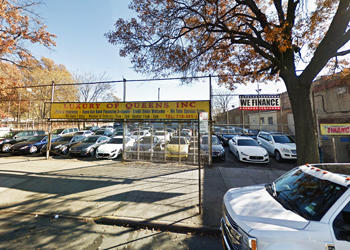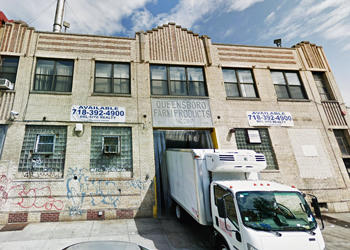Trending
Steinway Square showdown: Developers allege Silverstein forced them out of 4,000-unit project in Queens
Silverstein Properties has planted a flag in a massive Astoria development site, but the original developers aren’t willing to let it go without a fight

Larry Silverstein is one of the most recognizable names in Manhattan development, having built some of the city’s tallest residential towers and a bulk of the new World Trade Center complex. But it wasn’t until this past spring that the Bedford-Stuyvesant native brought his company business into the outer boroughs.
Last month, Silverstein Properties’ ground lease for Queensboro Farm Products’ seven-lot development site in Astoria, Queens hit public records. However, it turns out that’s only a piece of a larger assemblage: Queensboro is just one of four landlords Silverstein is working with who collectively own 315,000 square feet of ground. Together, all the sites could give rise to nearly 4,000 apartments.
The overhaul wasn’t originally Silverstein’s idea, but that of a pair of developers who struggled for years to bring an ambitious plan they dubbed “Steinway Square” to life. Now, Henry Wollman of Quadriad Realty Partners and investor Robert Gans, who is perhaps best known for owning strip clubs, are suing Silverstein and the Astoria landlords, alleging the developer squeezed them out of their dream project.
The duo teamed up back in 2014 on a proposal for what would be one of the largest residential development projects in recent New York City history. They wanted to build nearly 4,000 rentals in the southeastern corner of Astoria, and formed a partnership, W&G Venture Holdings, hoping to pull off what previous developers couldn’t.
“There were several local guys that tried to put it together but they just weren’t able to come up with the right deal,” said Stephen Preuss, a broker at Cushman & Wakefield who was familiar with others’ previous attempts. “I think it was just a little bit large for the typical local Queens guys who would look at these development sites.”

35-19 Steinway Street (Credit: Google Maps)
According to his court filings, Wollman started putting the initial plan together in 2010 and initiated talks with the city government about rezoning the area. They eventually came to preliminary agreements for how a plan might move forward through the rezoning process, including floor-to-area ratios of 7.2, new parks, new recreational spaces and a new public school. The partners later began assembling the site, signing leases with three commercial landlords, including Queensboro Farms, King Kullen (a grocery store) and Wilbee Corporation. A Kaufman-Astoria studios site controlled by Bedrock Real Estate Partners would later come into play. Altogether, the sites, if rezoned, could yield more than 2.2 million square feet of residential and commercial development, according to charts filed in Wollman’s lawsuit.
Wollman and Gans weren’t going to do it alone. A project of that scale would need serious capital commitments from deep-pocketed real estate investors. Silverstein was first approached as a potential joint venture partner, according to Wollman’s complaint. Then, HFZ Capital Group, a company that has built several large, luxury condominiums, was in talks to help finance the project, according to court documents.
But in 2016, the developers saw their three temporary leases terminated after allegedly missing required payments. According to a complaint filed by Gans, Wollman was unable to make capital contributions and Gans eventually bought out Wollman’s share in the joint venture.

35-13 41st Street (Credit: Google Maps)
The pair continued, however, to work together to recover the leases, but Silverstein later managed to obtain the lease for the Queensboro Farms site for itself, leaving Wollman and Gans on the sidelines.
Now, Wollman and Gans allege that Silverstein will be unfairly taking advantage of years of groundwork, including rounds of negotiation with city planning over FARs and financial planning, to develop the project on its own. Instead of partnering with Gans and Wollman, the two argue, Silverstein went behind their back to “usurp” them and convince the Astoria landowners not to give them new leases.
Silverstein Properties declined to comment for this story. It’s unclear whether the firm plans to adopt Wollman and Gans’ ambitious vision for Steinway Square. That plan would have entirely relied on private funding, with 30 percent of its units set aside for middle-income residents.
Wollman declined to comment on the lawsuit, and his attorney, Eugene Scheiman, did not respond to requests for comment. Akerman attorney Joshua Bernstein, who is representing Gans, also declined to comment.
Gans’ complaint alleges that the leases were never terminated properly, rendering Silverstein’s new leases illegitimate.
“It got pretty far with city planning and then it stopped because of this whole dispute,” said a source familiar with the litigation, who spoke on the condition of anonymity.
Gans and Wollman have already spent $15 million on putting the development together, according to the complaints.
Silverstein’s lease for the Queensboro site alone is worth $33 million, according to the Wollman suit. After rezoning, Wollman projected that site alone would be worth $120 million and the entire site would be worth $361 million.
This isn’t Wollman’s first ambitious project to be potentially foiled by a competing developer. In Washington Heights, Wollman planned to build three residential towers, but two of the key sites were snapped up by HAP Development before he could get started.
“This is on hold right now,” Edwin Marshall, then Department of City Planning spokesman, told Community Board 12’s land use committee in 2013. “You can’t rezone property you don’t own.”




